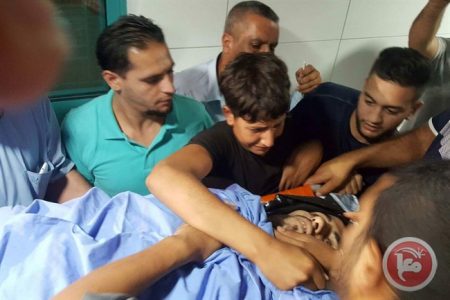Israeli authorities released the corpses of four Palestinians who were killed by Israeli forces during the month of July to their families, in the southern occupied West Bank, Friday.
According to Ma’an, authorities released the corpses of Abdullah Taqatqa, 24, from Marah Maalla in southern Bethlehem, and Muhammad Tnouh, 26, from the Tuqu town in southeast of Bethlehem, to Palestinian Red Crescent crews at the Mazmoria checkpoint east of Bethlehem.
The corpses were then transferred to the Beit Jala governmental hospital to undergo tests before determining the time that funerals will be held for the slain Palestinians.
Tnouh was killed by Israeli forces on July 20th, in Tuqu, after attempting to carry out a stabbing attack against Israeli soldiers, while Taqatqa was killed nearly a week ago, near the Gush Etzion junction, for allegedly attempting to carry out an attack on Israeli soldiers stationed in the area.
Meanwhile, the Palestinian Committee of Civil Affairs confirmed that it had received the corpse of Rafaat Hirbawi, 29,in Hebron city. Hirbawi was killed on July 18, after carrying out a vehicular attack that injured three Israeli soldiers.
The corpse of Ammar Ahmad Khalil Tirawi, aged 34, from Nablus’ Balata refugee camp and a resident of the Ramallah-area village of Kafr Ein, was returned at an Israeli checkpoint near the village of Abud, in northwest Ramallah.
Palestinian Civil Affairs and Tirawi’s family received his body in a Red Crescent ambulance at the Ramallah Medical Center.
Tirawi’s funeral is expected to take place Saturday afternoon in Kafr Ein.
Tirawi was killed in armed clashes with Israeli forces, in the Ramallah-area village of Nabi Saleh, on July 16. He left behind a wife and a small daughter. He was also a former prisoner of Israel who had spent more than seven years in Israeli prisons.
![]()
Israel has justified its policy of withholding Palestinian bodies killed by Israeli forces, claiming that the funerals provide grounds for “incitement” against the Israeli state, though the practice has been widely condemned by rights groups as an act of collective punishment, and deemed ineffective by Israeli security officials.
The policy has become so ingrained in the political climate of the occupied territory that Palestinians killed by Israeli forces, mostly during clashes, are quickly buried by their families in order to avoid the months of mourning which ensue when Israeli forces seize the corpses.
A member of Ir Amim, an Israeli rights organization, said that there have also been cases of Israeli forces digging up these graves in order to confiscate the corpses from the families.
During two weeks of unrest in occupied East Jerusalem, centered around Israeli security restrictions at Al-Aqsa Mosque, a video went viral showing the corpse of Muhammad Abu Ghannam, wrapped in a bloodied white sheet, being hurled over the walls of the al-Makassed hospital by family members desperate to hide his corpse from Israeli forces, who were raiding the hospital at the time.
The university student had been shot dead during clashes with Israeli forces amid the Al-Aqsa unrest.
The four slain Palestinians returned to their families, for burial, were among 53 Palestinians killed this year by Israelis. In the same time period, 13 Israelis have been killed by Palestinians, nine of whom were uniformed Israeli officers.
Scores of Palestinians have been killed in the past two years for alleged or actual attacks on Israelis, and during clashes with Israeli forces since a wave of unrest began in October of 2015. However, activists have pointed out that Palestinians experience routine Israeli violence on a daily basis regardless of any “upticks” of violence.
Palestinians have cited the daily frustrations and regular Israeli military violence imposed by Israel’s nearly half century occupation of the Palestinian territory as main drivers for Palestinian attacks on Israelis.

